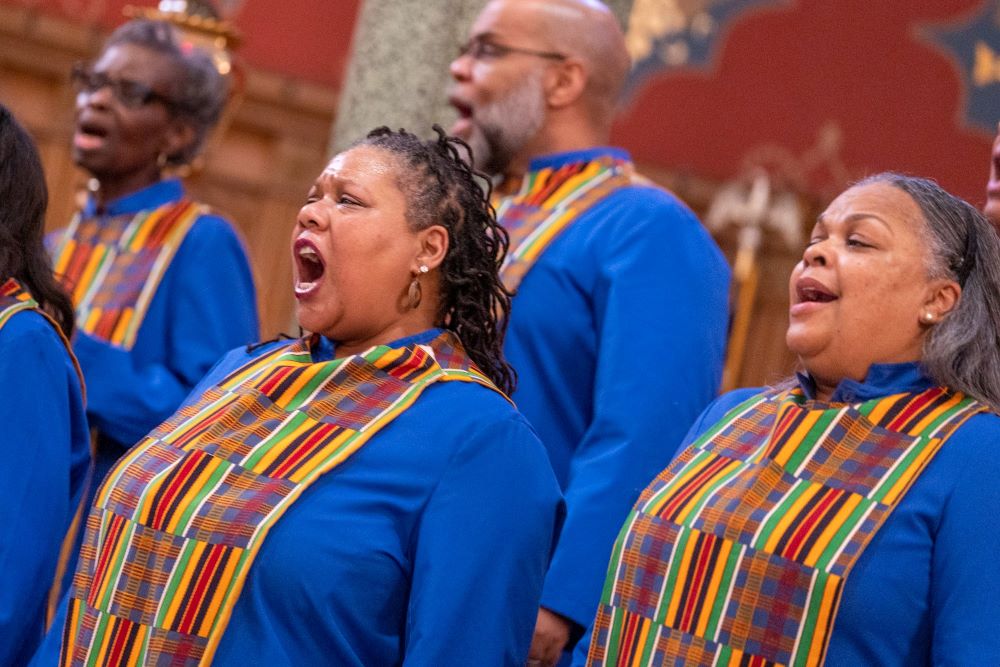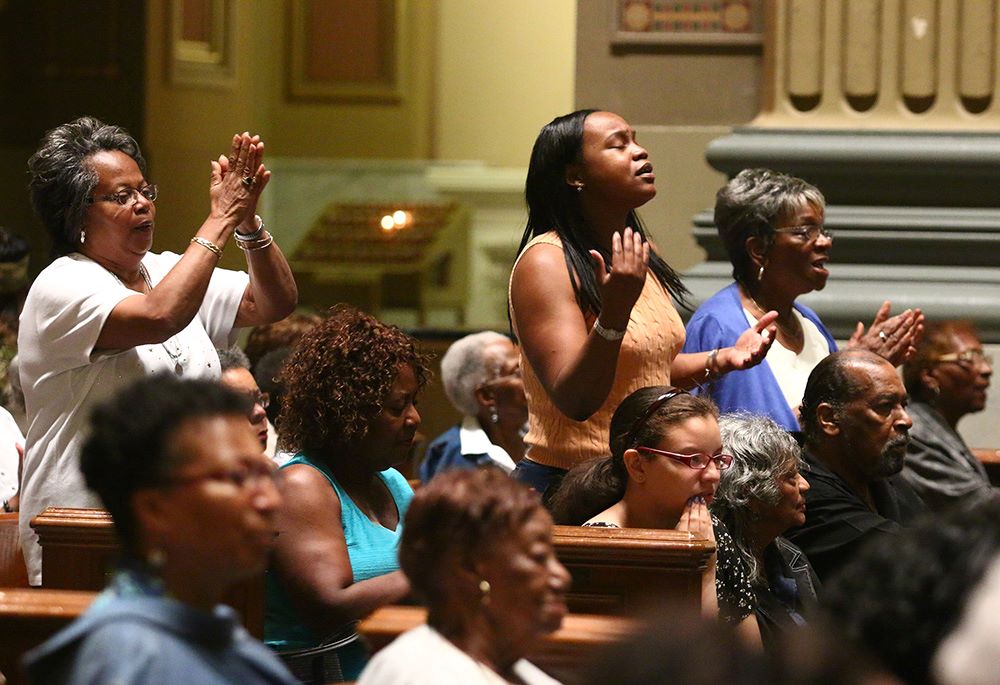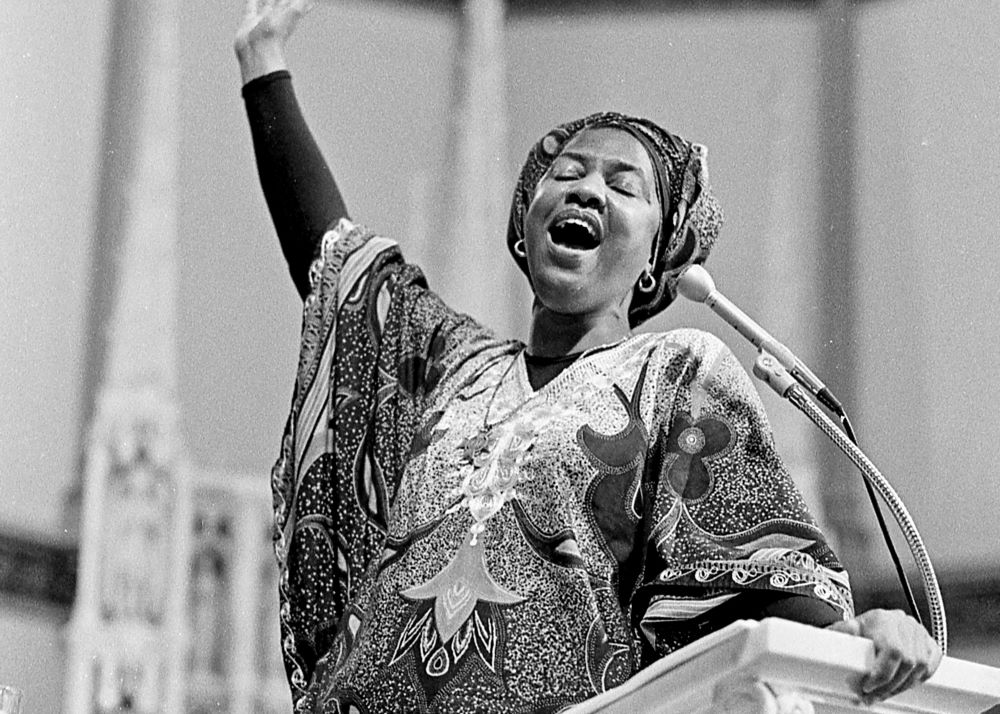
Members of the gospel choir of Holy Comforter-St. Cyprian Parish sing during the Feb. 5, 2023, Mass for Black History Month at Holy Comforter-St. Cyprian Church in Washington. (OSV News/Catholic Standard/Mihoko Owada)
Recently I attended my first Dave Matthews Band concert. Over the last couple years, I have become an avid listener of DMB as a result of their eclectic musical stylings, which includes influences from rock and roll, bluegrass, country music, the blues and other genres. The concert was sold out and I was, noticeably, one of very few Black people in attendance — and the only Black person in my section.
While DMB is areligious, my experience at the concert had an overwhelmingly religious tenor. The soulful stylings of the music were reminiscent of the gospel music that characterized many of the predominantly Black churches and parishes that I have attended all my life. Perhaps even more striking was the response of DMB fans. Throughout the performance, I observed the full range of emotions exhibited by attendees: I witnessed people singing, shouting, dancing in the aisles. I saw people crying. I even observed an attendee become so emotionally stirred that she appeared to have fainted.
The truth is, gospel music is sacred music.
On several occasions, Dave Matthews has publicly acknowledged the profound influence of Black artists and the Black musical tradition writ large on his own music. While Black Americans comprise a small minority of DMB's loyal fanbase, I imagine that at least some of them hear in his music what I hear: traces of the joy and pain of Black life as expressed in the music which arises out of the Black experience. While his white fans are not listening to his music through a Black epistemology, I contend that at least some of them also hear something profound, maybe even transcendent.
After this concert I began to wonder, since we know the potential of this type of soulful music to reach the hidden depths of the human, how much more powerful could it be in the context of Eucharistic worship where the focus is the One who is truly transcendent, Jesus Christ? Why is there so much continued resistance to the incorporation of gospel music in the celebration of the Mass?

Black Catholics participate in a revival in the Cathedral Basilica of Sts. Peter and Paul in Philadelphia in this undated photo. (CNS/CatholicPhilly.com/Sarah Webb)
The incorporation of gospel music into the Roman Rite is in full continuity with the liturgical rubrics of the church. The early 1960s had already begun to witness the strivings of Black music ministers and composers who imagined ways that the liturgy could reflect the lived experience of Black Catholics. But the Second Vatican Council's call for the inculturation of the Mass was a watershed moment for Black Catholics and other communities as it provided opportunities for cultural expression in the liturgy that had previously never been possible.
One of the primary objections that many Catholics have to gospel music being incorporated into the liturgy is the assumption that gospel music, with its rhythmic, upbeat and improvisational style, is assumed to be secular and therefore detracts from the solemnity of the Mass. And although gospel music and its associated aesthetics are decidedly different from other genres of presumably sacred music which often derive their character from a European milieu, gospel music is no less suitable to create the atmosphere appropriate for Eucharistic worship.
The truth is, gospel music is sacred music.
African American studies scholar Jon Michael Spencer argues that for Black people, the role of rhythm in corporate worship cannot be understated. He describes the rhythm as providing the pulse of the music, but it is the Holy Spirit that provides the impulse. It is this holy impulse in the context of Black worship that makes all the difference; the Spirit inspired impulse to move, clap, shout or dance in the context of Black worship is a sign of God’s sustaining presence in the community.
Gospel music is sacred music because it is centered on the witness of the crucified and risen Christ as Black people have received it. It is sacred because in its embodied expression, we affirm, by the power of the Holy Spirit, that despite the realities of an anti-Black world, we too are children of God.

Sr. Thea Bowman, a Franciscan Sister of Perpetual Adoration who is a candidate for sainthood, is shown at St. Augustine Church in Washington in 1986. She died in 1990. (OSV News/Catholic Standard/CNS file, Michael Hoyt)
Noted priest, theologian and liturgist Clarence Joseph Rivers connected the relationship between Black worship and the spirit in The Spirit of Worship. He wrote:
A singer who performs without feeling lacks soul. As in the original biblical concept of the spiritual, the spirit or the soul is the life principle, the source of life and liveliness, of dynamism and movement, of motion and emotion. That which is unmoved and unmoving is not spiritual, it is dead! To be spiritual is to be alive, to be capable of moving and responding to movement. Since the Spirit moves, that which does not move would seem to lack the presence of the Spirit.
The gospel music tradition takes seriously the psalmist's invitation to make a joyful noise before the Lord and to come before His presence with singing (Psalm 100). Music as a constitutive part of the human experience has the potential to function as a mode of encounter. Music that is centered on the Incarnate Word helps provide the context for encounter with the Spirit. It is difficult to have a genuine encounter with the Holy Spirit and retain hatred or bigotry for the other in the worshiping community.
Advertisement
As we sojourn in a world and a church that continues to struggle with the scourge of racism, these Spirit-inspired worship experiences are places of radical, genuine encounter. They are not just encounters with the Holy Spirit, but also encounters with other culturally informed expressions of the faith that might be aesthetically different from your own. They are places where the impulse of the Spirit tears down the walls of racialized hatred and bigotry.
In her now famous 1989 address to the USCCB, Servant of God Sr. Thea Bowman said the following:
I bring my whole history, my traditions, my experience, my culture, my African-American song and dance and gesture and movement and teaching and preaching and healing and responsibility – as gifts to the church. I bring a spirituality … [that] is contemplative and biblical and holistic, bringing to religion a totality of mind and imagination, of memory, of feeling and passion, and emotion and intensity.
The tradition of gospel music provides the context for these gifts to be shared with the universal church. While this tradition was birthed out of the lived experience of Black Americans, its impact isn't limited to the Black community. Its power and spiritual possibility transcends categories of race, offering the opportunity for people of every background and culture to encounter the Holy One in a transformative way.
As we celebrate Black History Month, I pray that the gifts that Black Catholics bring to the universal church might be celebrated with the same dignity and value as so many of the other rich cultural traditions that find resonance in the church. May the sound of Black worship be a reminder that like the wind, the Spirit of God blows where it wills, often in the places where we least expect.







